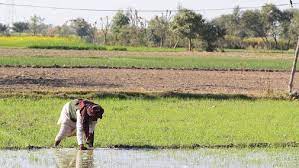KATHMANDU, June 30: India needs to think about alternative ways of doing agriculture so that the country doesn’t run out of groundwater resources and “destroy” the soil, said Dr Shahidur Rashid, Director-South Asia the International Food Policy Research Institute (IFPRI).
In an exclusive interview with PTI on the sidelines of the recent launch of the Global Food Policy Report (GFPR) in Kathmandu, Nepal, Rashid stressed on the importance of developing heat-tolerant crop varieties and adopting sustainable irrigation techniques.
“Flood irrigation, prevalent in rice cultivation, leads to water wastage and decreases water use efficiency. Implementing innovative irrigation methods and embracing solar power for irrigation can reduce carbon footprints and alleviate water scarcity issues,” he said.
Rashid emphasised that while India currently has sufficient food production to feed its population, challenges lie in ensuring accessibility, nutritional value, and long-term stability.
The biggest challenge, he said, for India is that the system that was developed since the Green Revolution — a period of technology transfer initiatives that saw greatly increased crop yields and agricultural production— which extensively exploits groundwater, and uses heavy chemical fertilisers cannot be sustainable in the long run.
“We really need to think about alternative ways of doing agriculture so that we don’t run out of groundwater resources and we don’t destroy our soil. I think that is going to be the main challenge for India and South Asia for the future,” Rashid explained.
He highlighted the importance of integrating nutrition components into social safety net programmes to combat nutritional deficiencies effectively.
The GFPR South Asia report noted that the prevalence of undernourishment was 16 per cent in India between 2019 and 2021.
“Merely consuming staple crops like rice and wheat is insufficient for a healthy life, as the country grapples with micronutrient deficiencies, also known as hidden hunger,” he said, stressing the importance of addressing these issues to cultivate a healthy generation for the future.
Regarding production, Rashid acknowledged that India produces enough food in terms of quantity, however, the methods employed, such as excessive fertiliser subsidies and groundwater exploitation, are not sustainable in the long run.
To mitigate these challenges, he highlighted the significance of alternative agricultural approaches that conserve groundwater resources and preserve soil health.
“Initiatives like the soil health card provide valuable insights into soil nutrient deficiencies, aiding in the production of nutritionally rich crops,” Rashid added.
Soil Health Card is a Government scheme used to assess the current status of soil health and, when used over time, to determine changes in soil health that are affected by land management.
When discussing food availability, accessibility, and affordability, Rashid pointed out the multi-faceted nature of the problem, saying income disparities hinder large sections of the Indian population from affording a healthy diet.
“Additionally, cultural preferences and habits play a role in determining the effectiveness of nutrition interventions. Developing crop varieties fortified with essential micronutrients, such as zinc and boron, can help address cultural barriers, especially in rice-consuming regions,” he said.
Last year, the Union Government approved a scheme to provide fortified rice under the public distribution system.
Rashid, one of the authors of the IFPRI report, also emphasised the need for a paradigm shift in irrigation practices, stressing the importance of developing heat-tolerant crop varieties and adopting sustainable irrigation techniques.
“Water use efficiency has to improve and the International Water Management Institute, a sister organisation of the CGIAR has been working on, and that is another very important area because otherwise groundwater, the water table is depleting which is not a very good sign,” the food expert added.
Discussing the environmental impact of food loss and waste, Rashid underscored the need for a comprehensive approach.
“The focus should extend beyond cereals like maize, rice, and wheat to encompass all perishable commodities. With approximately 8 per cent of global greenhouse gas emissions linked to food waste alone, urgent action is required to address this issue and ensure environmental sustainability,” he added.
Another concern, Rashid said is that India’s fertiliser subsidy is “extremely high”.
“You’re putting extra nutrients on the soil that can lead to a lot of problems in the future. If you go to the Northern part of Bangladesh, they’re already facing that problem because they are using so much urea and other fertiliser that is causing groundwater contamination. For example, they were extracting so much water that the arsenic problem became big,” he noted.
Arsenic is found at the bottom of the water table. When too much water is pumped, it comes in contact with oxygen, and then subsequently when water is pumped, arsenic comes out which can cause human health issues.
Addressing concerns about shifting to alternative crops like quinoa and millet, Rashid acknowledged their resilience and potential contribution to climate change mitigation and soil conservation.
However, he cautioned against perceiving them as universal solutions due to the sheer scale of global food demand.
“Even in India, despite all this attention to millet mission, I’ll be surprised if it takes up significantly within the next few years,” he added.
To accelerate sustainable agricultural development, Rashid emphasised the importance of collaboration and knowledge exchange between institutions like the Indian Council of Agricultural Research (ICAR) and international centres of excellence, adding such partnerships can expedite the development of resilient and sustainable crop varieties.
Rashid also highlighted the need to reevaluate agricultural policies, advocating for a transition away from excessive subsidies, and emphasised the importance of knowing when to enter and exit support mechanisms.
“Redirecting the significant financial resources currently spent on subsidies towards investment in sustainable agriculture could address pressing challenges such as climate change and crisis management,” the scientist added. (PTI)
Home International Need to transform agricultural practices in India for a sustainable future: IFPRI...


